Highlights
- Gaudi 3 delivers a 50% faster AI training time over its predecessor, Gaudi 2.
- Outperforms NVIDIA’s H100 in training and inference, promising 50% quicker LLaMA benchmarks.
- Equipped with 128GB HBM2e memory and a whopping 3.7TB/s bandwidth.
- Partnerships with major server manufacturers like Dell, HPE, and Lenovo already in place.
Intel has pulled back the curtain on its latest AI hardware accelerator aimed at powering the next wave of advanced AI applications.
The Gaudi 3 chip promises a major performance boost over previous generations.
Intel Gaudi 3 Specs

At an event showcasing Intel’s AI strategy, the tech giant revealed new details and benchmarks for the Gaudi 3 accelerator.
And the numbers are eye-catching.
Compared to Intel’s flagship AI chip Habana Gaudi 2, the new Gaudi 3 delivers a 50% faster training time across large language models like LLaMA 2.
It achieves this improved speed while being more power efficient thanks to TSMC’s 5nm chip manufacturing process.
Guadi 3 Outperforms Competitors
But Intel hasn’t just pitted Gaudi 3 against its own chips.

Benchmarks also show it outcrunching NVIDIA’s powerful H100 data centre GPU on AI model training across a suite of tests.
For the hotly-contested LLaMA benchmarks, Gaudi 3 is claimed to be 50% quicker at training the 7B and 13B parameter versions.
The performance uplift carries through to inference workloads too.
Here, Intel asserts Gaudi 3 provides 50% faster inferencing than H100 with better power efficiency on models like LLaMA 7B/70B and the gigantic 180B parameter Falcon model.
Gaudi 3’s specifications seem to back up the bold claims.
It packs a hefty 128GB of HBM2e memory with a staggering 3.7TB/s of bandwidth.

And with a huge 900W TDP, it has ample thermal headroom for demanding AI workloads.
While real-world tests await, Intel is clearly positioning Gaudi 3 as a formidable rival to NVIDIA’s AI computing prowess.
Major server makers like Dell, HPE and Lenovo are already on board as partners too.
As demand for generative AI skyrockets, Intel is betting big that Gaudi 3’s potent combination of speed, efficiency and scalability will give it an edge in the cut-throat AI silicon market.
FAQs
What advancements does the Gaudi 3 AI Accelerator bring to AI model training?
Intel’s Gaudi 3 AI Accelerator marks a significant leap in AI model training performance.
Offering a 50% faster training time compared to its predecessor, the Gaudi 2, and surpassing NVIDIA’s H100 in a range of benchmark tests, it’s tailored for large language models like LLaMA 2.
With these capabilities, Gaudi 3 is designed to significantly speed up the development and deployment of advanced AI applications.
How does Gaudi 3 compare to NVIDIA’s H100 GPU in terms of performance?
In direct comparisons, the Gaudi 3 AI Accelerator outperforms NVIDIA’s H100 data centre GPU, especially in training large AI models.
Benchmarks indicate that Gaudi 3 is 50% faster at training both 7B and 13B parameter versions of the LLaMA model.
This performance advantage extends to inference tasks, where Gaudi 3 also claims a 50% speed increase over the H100, showcasing its superior efficiency and computational power.
What are the key specifications of the Gaudi 3 AI Accelerator?
The Gaudi 3 AI Accelerator boasts impressive specifications, including 128GB of HBM2e memory and an astounding 3.7TB/s bandwidth, which are critical for processing vast amounts of data quickly.
Its 900W total design power (TDP) provides the thermal capacity required for sustained high-performance operation, making it well-suited for demanding AI workloads and large model training.
Who are Intel’s partners in bringing Gaudi 3 to the market?
Intel has secured partnerships with leading server manufacturers, including Dell, HPE, and Lenovo, to integrate the Gaudi 3 AI Accelerator into their server offerings.
These collaborations ensure that the Gaudi 3 will be readily available for deployment in data centres and research institutions, facilitating widespread adoption of this cutting-edge AI technology.
Also Read: Intel Announces 14th Gen Core HX and Ultra CPUs at CES 2024
Also Read: Intel Core 14th Gen i9-14900KS Powers Desktop PCs to Record-Breaking Speeds
